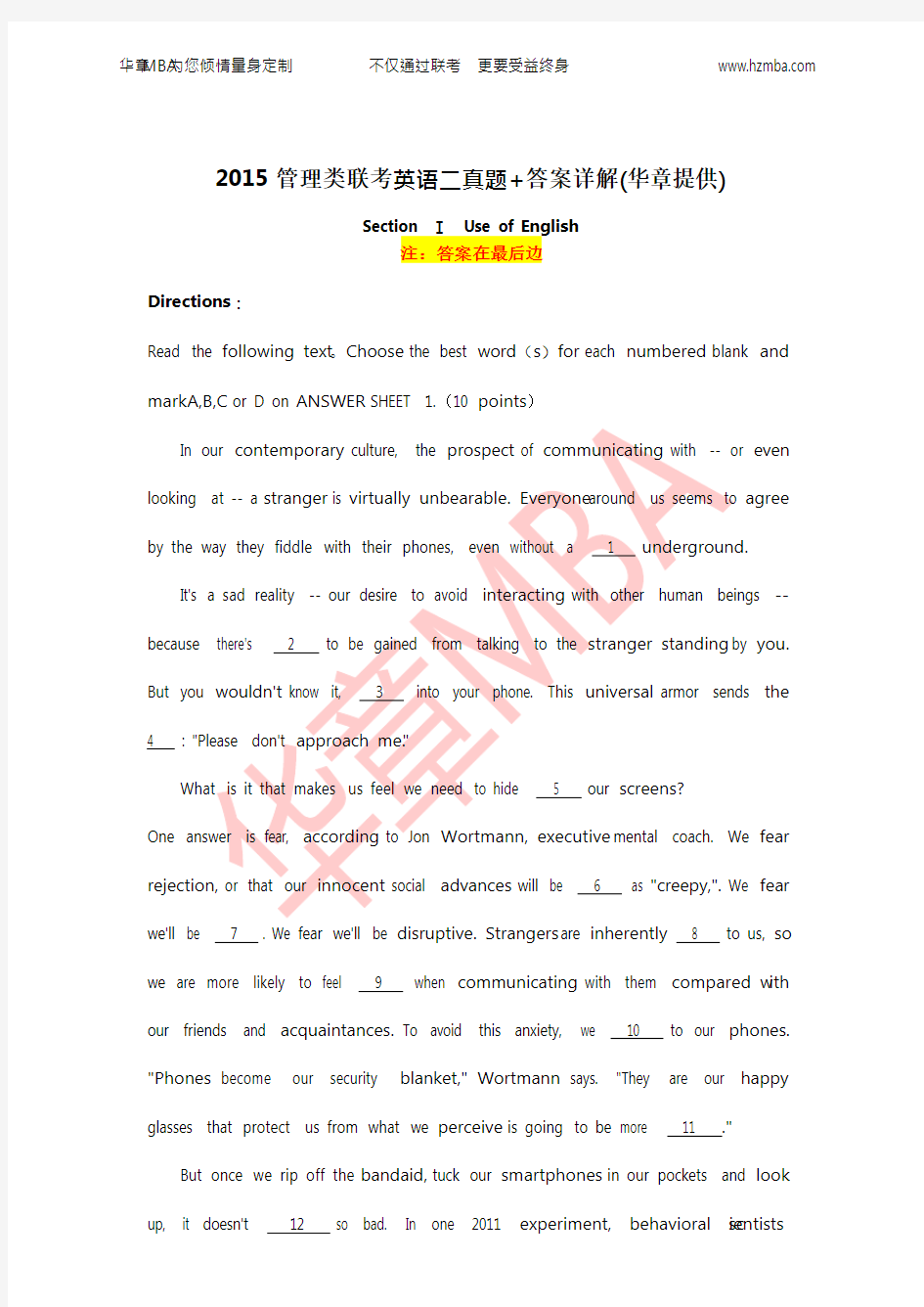2015管理类联考英语二真题+答案详解(华章提供)

- 1、下载文档前请自行甄别文档内容的完整性,平台不提供额外的编辑、内容补充、找答案等附加服务。
- 2、"仅部分预览"的文档,不可在线预览部分如存在完整性等问题,可反馈申请退款(可完整预览的文档不适用该条件!)。
- 3、如文档侵犯您的权益,请联系客服反馈,我们会尽快为您处理(人工客服工作时间:9:00-18:30)。
华章MBA为您倾情量身定制不仅通过联考更要受益终身
2015管理类联考英语二真题+答案详解(华章提供)
Section ⅠUse of E ng li s h
注:答案在最后边
D i r ec t i o n s:
Read the following text。Choose the best word(s)for each numbered blank and markA,B,C or D on ANSWER SHEET 1.(10 po i n t s)
In even
ag r ee by the .
It's --
you.
But you t he
4
One f ea r
f ea r
we'll be 7 . We fear we'll be disruptive. Strangers are inherently 8 to us, so we are more likely to feel 9 when communicating with them compared w it h our friends and acquaintances. To avoid this anxiety, we 10 to our phones.
"Phones become our security blanket," Wortmann says. "They are our happy glasses that protect us from what we perceive is going to be more 11 ."
But once we rip off the bandaid, tuck our smartphones in our pockets and l oo k up, it doesn't 12 so bad. In one 2011 experiment, behavioral sc i en tist s
华章MBA为您倾情量身定制不仅通过联考更要受益终身 Nicholas Epley and Juliana Schroeder asked commuters to do the unthinkable: S t a rt
a 13 . They had Chicago train commuters talk to their fellow 14 . "When D r.
Epley and Ms. Schroeder asked other people in the same train station to 15 how they would feel after talking to a stranger, the commuters thought their 16 would be more pleasant if they sat on their own," the New York Times summa ri zes.
Though the participants didn't expect a positive experience, after they 17 wit h the experiment, "not a single person reported having been snubbed."
18 , these commutes were reportedly more enjoyable compared with t hose
sans communication, which makes absolute sense, 19 human beings thrive o ff of social connections. It's that 20 : Talking to strangers can make you f eel connec t ed.
1. [A] ticket [B] permit [C] signall [D] r eco r d
2. [A] nothing [B] link [C] another [D] much
3. [A] beaten [B] guided [C] plugged[D] brough t
4. [A] message [B] cede [C] notice [D] sign
5. [A] under [B] beyond [C] behind [D] fr om
6. [A] misinterprete [B] misapplied [C] misadjusted [D] m is ma t ched
7. [A] fired [B] judged [C] replaced [D] delayed
8. [A] unreasonable [B] ungreatful [C] unconventional [D] un f am ili a r
9. [A] comfortable [B] anxious [C] confident [D] angry
10. [A] attend [B] point [C] take [D] t u r n
11. [A] dangerous [B] mysterious [C] violent [D] bo r ing
12. [A] hurt [B] resist [C] bend [D] decay
13. [A] lecture [B] conversation [C] debate [D] nego ti a ti on
14. [A] trainees [B] employees [C] researchers [D] passengers
15. [A] reveal [B] choose [C] predictl [D] design
16. [A] voyage [B] flight [C] walk [D] r ide
17. [A] went through [B] did away [C] caught up [D] put up
18. [A] In turn [B] In particular [C] In fact [D] In consequence
19. [A] unless [B] since [C] if [D] whereas
20. [A] funny [B] simple [C] logical [D] r a r e
Section II Reading Co m p r eh en s i o n
Part A
D i r ec t i o n s:
Read the following four texts. Answer the questions below each text by choosing A, B, C or D. Mark your answers on ANSWER SHEET 1. (40 po i n t s)
Text 1
A new study suggests that contrary to most sur veys, people are actually mo r e stressed at home that at work. Researchers measured people’s cortisol, which i s stress marker, while they were at work and while they were at home and found it higher at what is supposed to be a place of r efuge.
“Further contradicting conventional wisdom, we found that women as well as men have lower levels of stress at work than at home,” writes one of t he researchers, Sarah Damaske. In fact women even say they feel better at work, she
